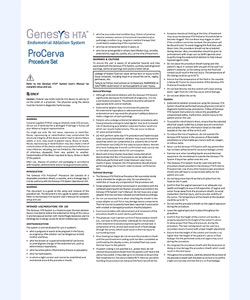Genesys HTA Directions for Use
Intended Use/Indications for Use
The Genesys HTA System is a hysteroscopic thermal ablation device intended to ablate the endometrial lining of the uterus in premenopausal women with menorrhagia (excessive uterine bleeding) due to benign causes for whom childbearing is complete.
The system is contraindicated for use in a patient:
- who is pregnant or wants to be pregnant in the future, as pregnancy after ablation can be dangerous to both mother and fetus;
- who has known or suspected endometrial carcinoma or premalignant change of the endometrium, such as adenomatous hyperplasia;
- who has active pelvic inflammatory disease or pyosalpinx;
- who has hydrosalpinx;
- in whom a tight cervical seal cannot be established and maintained around the procedure sheath;
- who has any anatomical condition (e.g., history of previous
- classical cesarean section or transmural myomectomy) or pathologic condition (e.g., long term medical therapy) that could lead to weakening of the myometrium;
- who has an intrauterine device in place; or
- who has an active genital or urinary tract infection (e.g., cervicitis, endometritis, vaginitis, cystitis, etc.), at the time of treatment.
General Warnings
- Although endometrial ablation with the Genesys HTA System significantly decreases the likelihood of pregnancy, it is not a sterilization procedure. The patient should be advised of appropriate birth control methods.
- Endometrial ablation does not eliminate the potential for endometrial hyperplasia or adenocarcinoma of the endometrium and may mask the physician’s ability to detect or make a diagnosis of such pathology.
- Patients who undergo endometrial ablation procedures who have previously undergone tubal ligation may be at increased risk of developing post ablation tubal sterilization syndrome which can require hysterectomy. This can occur as late as 10 years post-procedure.
- DO NOT perform same day HTA procedure and hysteroscopic tubal occlusion/sterilization. Ablation may cause intrauterine synechiae which can compromise (i.e. prevent) the 3-month confirmation test (HSG) for the tubal occlusion device. Women who have inadequate 3-month confirmation tests cannot rely on the tubal occlusion device for contraception.
- Bench and clinical studies have been conducted which demonstrate that the HTA procedure can be safely and effectively performed with nickel titanium tubal micro-inserts in place. However, the HTA procedure should only be performed after the 3-month tubal occlusion confirmation test.

